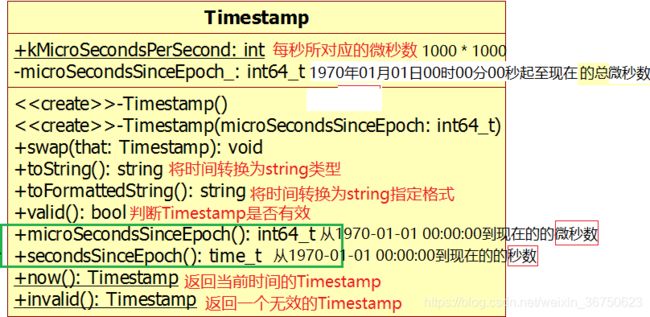muduo_base代码剖析之Timestamp、AtomicIntegerT、Exception
一、Timestamp类封装
- 时间戳一般用来唯一地标识某一刻的时间,通常是指格林威治时间1970年01月01日00时00分00秒起至现在的总微秒数
- Timestamp类使用的是微秒数,即用微秒数构建Timestamp对象。因此需要将微秒数转换成大家比较熟悉的秒数
class Timestamp : public muduo::copyable,
public boost::equality_comparable<Timestamp>,
public boost::less_than_comparable<Timestamp>
{
public:
Timestamp()
: microSecondsSinceEpoch_(0) //到现在的总微秒数
{
}
explicit Timestamp(int64_t microSecondsSinceEpochArg)
: microSecondsSinceEpoch_(microSecondsSinceEpochArg)
{
}
void swap(Timestamp& that)
{
std::swap(microSecondsSinceEpoch_, that.microSecondsSinceEpoch_);
}
//判断时间是否有效
bool valid() const { return microSecondsSinceEpoch_ > 0; }
//返回一个无效的时间
static Timestamp invalid()
{
return Timestamp();
}
//从1970-01-01 00:00:00到现在的的微秒数
int64_t microSecondsSinceEpoch() const { return microSecondsSinceEpoch_; }
//从1970-01-01 00:00:00到现在的的秒数
time_t secondsSinceEpoch() const
{
//microSecondsSinceEpoch_:从1970-01-01 00:00:00到现在的的微秒数
//kMicroSecondsPerSecond:每秒所对应的微秒数1000 * 1000
return static_cast<time_t>(microSecondsSinceEpoch_ / kMicroSecondsPerSecond);
}
static Timestamp now()
{
struct timeval tv;
gettimeofday(&tv, NULL); //获取当前的时间
int64_t seconds = tv.tv_sec;
// 秒数 * 每秒对应的微秒数 + 微秒数
//用微秒数构造Timestamp对象,并返回
return Timestamp(seconds * kMicroSecondsPerSecond + tv.tv_usec);
}
static Timestamp fromUnixTime(time_t t)
{
return fromUnixTime(t, 0);
}
static Timestamp fromUnixTime(time_t t, int microseconds)
{
return Timestamp(static_cast<int64_t>(t) * kMicroSecondsPerSecond + microseconds);
}
//转换成字符串格式:秒.微秒
string toString() const
{
char buf[32] = {0};
int64_t seconds = microSecondsSinceEpoch_ / kMicroSecondsPerSecond; //秒
int64_t microseconds = microSecondsSinceEpoch_ % kMicroSecondsPerSecond; //微秒
snprintf(buf, sizeof(buf)-1, "%" PRId64 ".%06" PRId64 "", seconds, microseconds);
return buf;
}
//转换成指定格式
// 年月日 时:分:秒 20180905 08:45:56
string toFormattedString(bool showMicroseconds = true) const
{
char buf[64] = {0};
time_t seconds = static_cast<time_t>(microSecondsSinceEpoch_ / kMicroSecondsPerSecond); //秒
struct tm tm_time;
gmtime_r(&seconds, &tm_time); //将日历时间seconds转换为用UTC时间表示的时间struct tm tm_time
if (showMicroseconds) //显示微秒
{
int microseconds = static_cast<int>(microSecondsSinceEpoch_ % kMicroSecondsPerSecond);
snprintf(buf, sizeof(buf), "%4d%02d%02d %02d:%02d:%02d.%06d",
tm_time.tm_year + 1900, tm_time.tm_mon + 1, tm_time.tm_mday,
tm_time.tm_hour, tm_time.tm_min, tm_time.tm_sec,
microseconds);
}
else //不显示微秒
{
snprintf(buf, sizeof(buf), "%4d%02d%02d %02d:%02d:%02d",
tm_time.tm_year + 1900, tm_time.tm_mon + 1, tm_time.tm_mday,
tm_time.tm_hour, tm_time.tm_min, tm_time.tm_sec);
}
return buf;
}
static const int kMicroSecondsPerSecond = 1000 * 1000;//每秒所对应的微秒数
private:
//唯一的成员变量:表示1970年01月01日00时00分00秒起至现在的总微秒数
int64_t microSecondsSinceEpoch_;
};
两个全局函数:timeDifference、addTime
//计算时间差:high-low,单位:秒
inline double timeDifference(Timestamp high, Timestamp low)
{
int64_t diff = high.microSecondsSinceEpoch() - low.microSecondsSinceEpoch();
return static_cast<double>(diff) / Timestamp::kMicroSecondsPerSecond;
}
//将Timestamp类型的变量,加上seconds秒
inline Timestamp addTime(Timestamp timestamp, double seconds)//此处的timestamp是值传递
{
// 总微秒数 = 秒数 * 每秒所对应的微秒数,即1000*1000
int64_t delta = static_cast<int64_t>(seconds * Timestamp::kMicroSecondsPerSecond);
//先转换成微秒:timestamp.microSecondsSinceEpoch() + delta
//再用微妙构建时间对象Timestamp
return Timestamp(timestamp.microSecondsSinceEpoch() + delta);
}
- 使用到了BOOST_STATIC_ASSERT,编译时断言;常见的assert是运行时断言,用一个小例子来理解BOOST_STATIC_ASSERT:
#include - 函数参数采用值传递
类对象作为参数传递并不一定采用引用传递更高效,这里采用值传递,是因为Timestamp类只包含一个类型为int64_t的数据成员microSecondsSinceEpoch_,所以我们可以把Timestamp对象看作是一个64位(8字节)的整数。参数传递的过程中,会把参数传递到一个8字节的寄存器中而不是传递到堆栈当中(在对应的64位平台),它的效率会更高。 - 使用PRId64
int64_t用来表示64位整数,在32位系统中是long long int,在64位系统中是long int,所以打印int64_t的格式化方法是:
printf("%ld",value); //64bit OS
printf("%lld",value); //32bit OS
上面的方法是不可以移植的,跨平台的做法:
// C++使用PRID64,需要两步:
// 包含头文件:二、整数原子类AtomicIntegerT的封装
- volatile作用:作为指令关键字,确保本条指令不会因为编译器优化而省略,且要求每次直接读值。简单地说就是防止编译器对代码进行优化。(被volatile修饰的变量,系统总是重新从它所在的内存中读取数据,而不是勇士保存在寄存器中的备份)
- 为什么需要原子性操作?
分析x++操作的执行过程:①从内存中读x的值到寄存器中②对寄存器加1③把新值写回x所处的内存地址
而,如果两个线程对一个变量进行++操作,可能会发生预想不到的结果!
解决方案有两种:(1)对变量加锁。(2)使用原子性操作,可以将①②③看成一个整体。
注意:锁的开销比原子性操作的开销大得多 - 原子性操作
注意:使用这些原子性操作,编译时需要加上-march=cpu-type
原子自增操作 *ptr+value
type __sync_fetch_and_add(type* ptr,type value)
返回值:没有加value之前的值
原子比较和(设置)操作
type __sync_val_compare_and_swap(type* ptr,type oldval, type newval)
先比较,再设置:if (*ptr == oldval),则*ptr = newval
返回值:返回原来的值oldval
bool __sync_bool_compare_and_swap(type* ptr,type oldval, type newval)
返回值:if (*ptr == oldval){*ptr=newval; 返回true}
else {不进行设置; 返回false;}
原子赋值操作 *ptr=value
type __sync_lock_test_and_set(type* ptr,type value)



